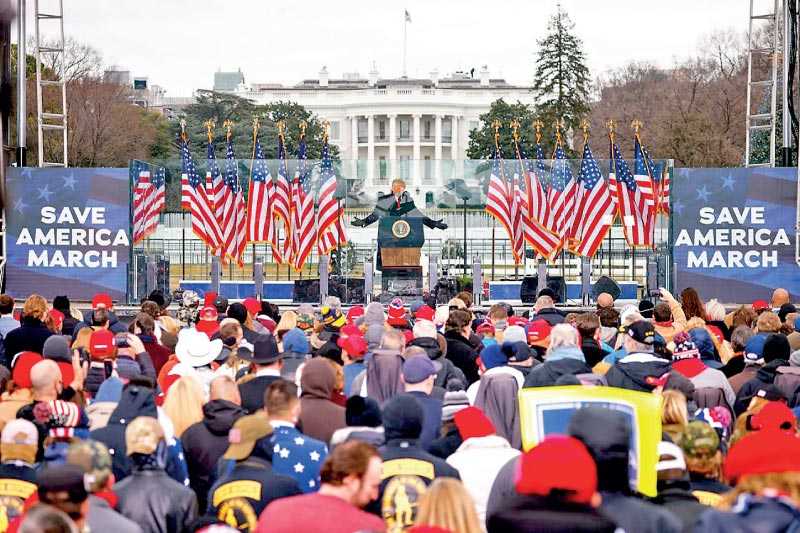Thursday Feb 26, 2026
Thursday Feb 26, 2026
Thursday, 4 February 2021 00:00 - - {{hitsCtrl.values.hits}}

US President Donald Trump speaks during a rally to contest the certification of the 2020 US presidential election results by the US Congress, in Washington - Reuters
Reuters: Emanuel Jackson, a 20-year-old Washington area man, was caught on video using a metal bat to strike the protective shields wielded by police officers as they tried to fend off rioters storming the US Capitol on 6 January.
Jackson, awaiting trial in federal court on assault charges, is now adopting a novel legal defence: seeking to pin the blame on Donald Trump, citing the former president’s remarks at a “Stop the Steal” rally shortly before the Capitol siege.
Trump told the crowd to “fight like hell,” said “we will not take it anymore” and repeated his false claims that the election was stolen from him through widespread voting fraud. Trump exhorted his followers to go to the Capitol. The ensuing rampage interrupted the congressional certification of President Joe Biden’s election victory, sent lawmakers into hiding and left five people dead including a police officer.
Jackson’s lawyer, Brandi Harden, wrote in a 22 January court filing that “the nature and circumstances of this offense must be viewed through the lens of an event inspired by the President of the United States.”
The Capitol siege, Harden added, “appears to have been spontaneous and sparked by the statements made during the ‘Stop the Steal’ rally.” Harden argued that Jackson should be released while awaiting trial. A judge on 22 January denied the request.
At least six of the 170 people charged in connection with the Capitol siege have tried to shift at least some of the blame onto Trump as they defend themselves in court or in the court of public opinion.
Other defendants to take this route include Jacob Chansley, who donned a horned headdress and face paint during the attack, and Dominic Pezzola, a member of the Proud Boys right-wing extremist group who is accused of shattering a window in the Capitol with a stolen police shield so rioters could enter.
“The boss of the country said, ‘People of the country, come on down, let people know what you think,’” Pezzola’s defence lawyer, Michael Scibetta, told Reuters. “The logical thinking was, ‘He invited us down.’”
Lawyers have not yet sought dismissal of charges or acquittal during a trial based on the idea that Trump incited their clients, instead making the claim as part of efforts to spare them from pretrial detention.
No defendant will be able to avoid criminal culpability by saying they were incited by Trump, said Jay Town, who served as the top federal prosecutor in Birmingham, Alabama, during the Trump administration.
“If anything, it is an admission to criminal conduct,” said Town, now the general counsel of cybersecurity firm Gray Analytics. “While this ineffective tactic may help with headlines, it will not help the fate of any defendant.”
Trump took to a stage near the White House and exhorted supporters to “fight” – using the word more than 20 times. Trump told the crowd that “everyone here will soon be marching over to the Capitol.” About 50 minutes into the speech, many of them did.
Trump adviser Jason Miller did not immediately respond to a request for comment on the legal strategy of blaming the former president. Trump has called his speech “totally appropriate.”
The Democratic-led House of Representatives voted to impeach Trump on a charge of “incitement of insurrection” stemming from his 6 January speech. He faces an impeachment trial next week in the Senate.